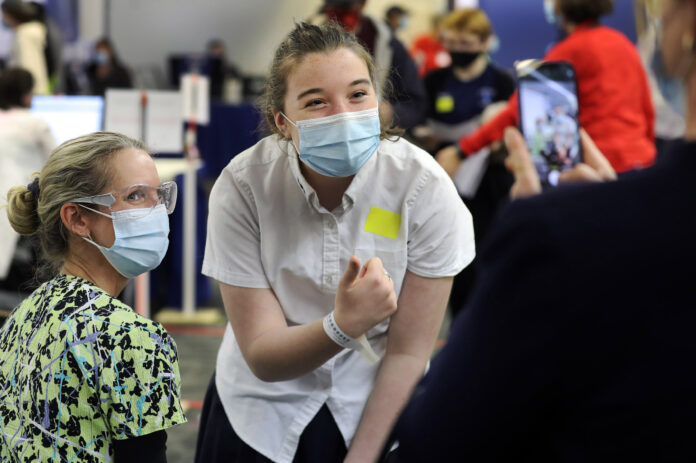
For more than a year, a fit, college-educated, 51-year-old relative successfully avoided getting COVID-19. He routinely wore masks and practiced social distancing around strangers while at work in the construction industry.
He took all the precautions that made sense, except the one that health experts say matters most – getting a vaccine.
About a week ago, he started feeling poorly but kept working, following his own plan, until his breathing became too labored to dismiss.
Today he’s in a hospital, getting treatment for COVID-19 pneumonia while attached around the clock to an oxygen tube.
He will hopefully be one of the lucky ones, though he’ll no doubt stubbornly remind everyone that vaccines are no guarantee against getting COVID-19.
It’s true, though they clearly increase the odds against infection, life-threatening illness and the spreading of the virus. Yet somehow, health officials are still struggling to get that message across in too many states, including Rhode Island, and are failing to take full advantage of ample vaccine supplies.
So, what else can be done? Providence Business News is participating in an initiative organized by The Boston Globe called “The Last Best Shot.” News organizations across the region are publishing editorials today urging people to get vaccinated and offering ideas to help states get closer to the herd immunity that may finally end the pandemic.
The Globe is also publishing stories debunking myths about the vaccines, offering ideas for persuading the unvaccinated and sharing stories from the recently vaccinated.
Rhode Island has done a good job getting residents tested and better than many states in encouraging vaccinations. Officials claim that more than 80% of eligible adults across the state have received at least one shot of a vaccine.
But virus transmission rates have still been rising in recent weeks, as they have across much of the country.
Gov. Daniel J. McKee said recently, “There is a path for the state to get to a 90%” vaccination rate. But beyond hoping for a boost in vaccinations after the U.S. Food and Drug Administration gives its expected full approval to the Pfizer and BioNTech vaccine, he hasn’t said how.
The answer is that it will take a shared commitment to a simple idea, rather than a one-size-fits-all approach: The vaccines have been proven to be good for both public health and business.
State and local governments and yes, employers, must sound that chorus in a final push to do whatever they can to encourage more vaccinations.
The RI Gives Vax Challenge vaccine incentive program is a nice way of helping nonprofits working in communities with high rates of unvaccinated residents. But that program is as much about rewarding past effort as it is about the nonprofits’ roles in new vaccinations.
The state has yet to offer lottery prizes to help boost new vaccinations. It should look to tap its expected $1 billion payment in new federal pandemic aid to do so, following the Massachusetts model that allows everyone who’s been vaccinated an equal shot at winning.
Rhode Island doesn’t have to look very far for help, with one of the world’s leading lottery system operators, International Game Technology PLC, in its backyard.
Gov. McKee’s ordered all health care companies to require employees to get vaccinated. Providence has also announced a vaccine mandate for city employees that other communities should consider. Government employees can help set an example.
And some companies are beginning to follow suit, including Pawtucket’s Hasbro Inc.
But other businesses have told PBN they worry a mandate will make it difficult to recruit and retain workers in a challenging job market. Rather than mandates, they should focus on getting as many people vaccinated as possible. Free food and other vaccination prizes can help build group support and encouragement in the workplace.
And we all can spread the word on vaccine facts to combat myths, along with cautionary tales of friends and family that, after 17 months, have become all too painfully common.
This is a PBN editorial published as part of a regional effort to promote vaccinations in coordination with The Boston Globe.











